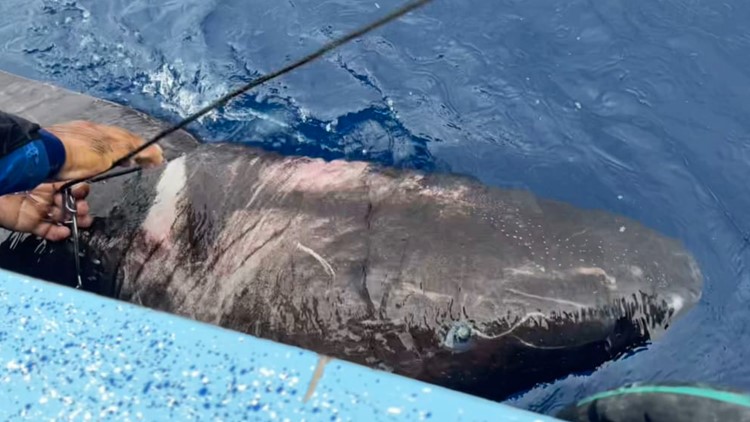MINNEAPOLIS — It's not every day you reel in a catch that could be hundreds of years old -- especially when that's not what you're fishing for at all.
Researchers were tagging tiger sharks off the southern coast of Belize recently when they pulled a strange creature to the surface. It had ancient-looking grey skin and tiny blue eyes. It wasn't a tiger shark, that's for sure.
Florida International University Ph.D candidate Devanshi Kasana took a video and sent it to her advisor, Dr. Demian Chapman.
"I knew right when I saw the video that we stumbled onto something incredible," said Chapman, who is the Director of Sharks & Rays Conservation Research at Mote Marine Laboratory & Aquarium in Sarasota, Florida.
He recognized it as a sleeper shark, a slow-moving species that lives in deep, cold water. The most likely candidate? A Greenland shark, thought to live for hundreds of years. The National Oceanic and Atmospheric Administration says these sharks are the longest-living vertebrates on the planet, living at least 250 years... and maybe past 500. Sharks are long-lived in general, but Chapman said the lifespans for Greenland sharks are "on another planet."
"That's an astonishing longevity -- to live centuries is really amazing," he said.
This particular shark was between 10 and 12 feet long. While its age couldn't be estimated, its large size suggested that it was mature -- and, Chapman said, likely "very old."
A deep-water mystery
Greenland sharks are common in the Arctic, but they're not something you expect to see on a trip to the Caribbean.
"This is the first record of a sleeper shark in the western Caribbean region," the researchers wrote last month in a article published in the journal Marine Biology.
So what was it doing there? Chapman said the catch supports a theory that Greenland sharks exist around the world -- just deeper than we usually look.
"When you think about it, logically, they like cold water, and there's cold water everywhere. It's just when you come close to the equator, that cold water is very, very deep."
It's also a question that may remain unanswered for the foreseeable future -- the team opted not to tag the shark to give it the best chance at survival.
"We do have satellite tags that we can put on one if we catch another, but it's kind of like saying 'Next time I win the lottery...'" Chapman said. "It's such a rare find. It may be a long time before we have an answer."
Life in the slow lane
The sluggish creatures may benefit from something humans complain about: A slow metabolism. The NOAA says the sharks' top speed is less than 1.8 miles per hour, they age slowly and may not reach sexual maturity until they're more than 100 years old.
Such a slow-moving life may be an adaptation to the cold waters Greenland sharks call home.
The sharks used to be hunted for liver oil, but now mostly end up in fishing nets by accident. They can dive as deep as 6,500 feet and are the only shark that can handle the chilly Arctic Ocean year-round.



